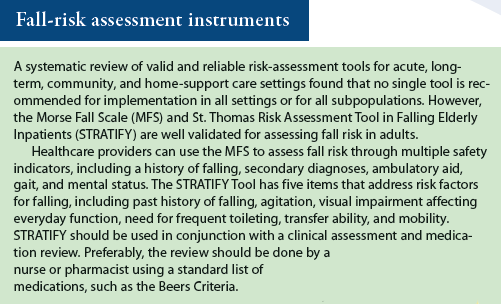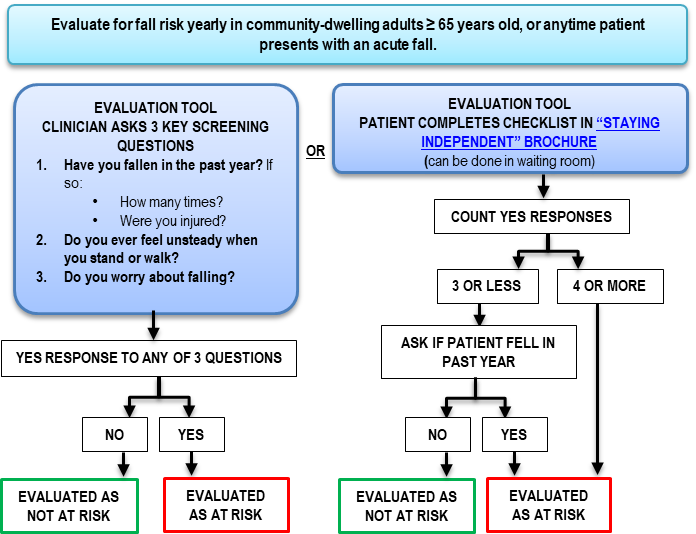Some Ideas on Dementia Fall Risk You Should Know
Table of Contents7 Simple Techniques For Dementia Fall RiskGetting The Dementia Fall Risk To WorkThe Best Strategy To Use For Dementia Fall RiskExamine This Report about Dementia Fall RiskThings about Dementia Fall Risk
Assessing fall threat assists the entire healthcare group create a safer environment for each client. Guarantee that there is an assigned area in your clinical charting system where personnel can document/reference scores and record relevant notes related to fall prevention. The Johns Hopkins Fall Threat Assessment Tool is one of many devices your staff can make use of to assist protect against negative clinical events.Individual falls in hospitals prevail and devastating unfavorable occasions that continue despite decades of effort to reduce them. Improving communication throughout the evaluating registered nurse, treatment group, individual, and individual's most involved close friends and household may enhance loss prevention initiatives. A team at Brigham and Women's Hospital in Boston, Massachusetts, looked for to create a standardized fall avoidance program that centered around improved interaction and client and family members engagement.

The technology group emphasized that effective implementation depends on patient and team buy-in, assimilation of the program right into existing process, and integrity to program processes. The team kept in mind that they are facing just how to make sure continuity in program implementation throughout durations of dilemma. During the COVID-19 pandemic, for instance, an increase in inpatient drops was related to limitations in client involvement in addition to restrictions on visitation.
Dementia Fall Risk - Truths
These incidents are usually considered avoidable. To carry out the intervention, companies require the following: Accessibility to Autumn ideas resources Autumn ideas training and re-training for nursing and non-nursing personnel, consisting of new registered nurses Nursing workflows that permit for client and household engagement to carry out the falls evaluation, ensure use the prevention strategy, and conduct patient-level audits.
The outcomes can be highly detrimental, commonly speeding up person decline and causing longer medical facility stays. One study estimated keeps raised an additional 12 in-patient days after a client fall. The Loss TIPS Program is based on interesting clients and their family/loved ones throughout three main procedures: evaluation, customized preventative treatments, and auditing to make certain that clients are involved in the three-step autumn prevention procedure.
The patient analysis is based on the Morse Fall Scale, which is a confirmed fall threat analysis tool for in-patient medical facility settings. The scale includes the six most typical factors patients in medical facilities drop: the person fall background, high-risk conditions (including polypharmacy), use of IVs and other exterior devices, mental status, gait, and wheelchair.
Each threat variable web links with one or even more workable evidence-based treatments. The registered view it nurse develops a plan that integrates the interventions and shows up to the care group, person, and family members on a laminated poster or published aesthetic help. Registered nurses develop the strategy while meeting the patient and the patient's family members.
About Dementia Fall Risk
The poster functions as an interaction tool with other participants of the client's treatment group. Dementia Fall Risk. The audit element of the program includes assessing the person's understanding of their risk factors and avoidance plan at the device and health center levels. Registered nurse champions carry out at least 5 private interviews a month with clients and their family members to inspect for understanding of the fall avoidance plan

An approximated 30% of these drops result in injuries, which here are the findings can vary in intensity. Unlike other negative occasions that require a standard scientific reaction, loss prevention depends highly on the requirements of the person.
Little Known Questions About Dementia Fall Risk.

Based upon auditing outcomes, one site had 86% compliance and 2 websites had more than 95% compliance. A cost-benefit evaluation of the Fall ideas program in 8 healthcare facilities estimated that the program price $0.88 per individual to implement and caused cost savings of $8,500 per 1000 patient-days in straight costs connected to the prevention of 567 falls over 3 years and 8 months.
According to the innovation group, companies curious about executing the program needs to carry out a readiness evaluation and falls prevention voids analysis. 8 In addition, companies should make certain the required framework and process for execution and establish an execution strategy. If one exists, the organization's Loss Avoidance Task Pressure should be associated with planning.
Some Ideas on Dementia Fall Risk You Should Know
To begin, companies should make sure conclusion of training components by nurses and nursing aides - Dementia Fall Risk. Health center staff ought to examine, based upon the requirements of a medical facility, whether to use an electronic health document hard copy or paper version of the loss avoidance strategy. Carrying out teams should hire and train registered nurse champions and establish processes for bookkeeping and coverage on autumn information
Team require to be associated with the process of redesigning the workflow to engage patients and family in the assessment and prevention plan process. Equipment must remain in location so that devices can recognize why a loss took place and remediate the reason. A lot more particularly, nurses must have channels to supply continuous comments to click here for info both personnel and unit management so they can readjust and enhance loss avoidance process and communicate systemic problems.
Comments on “Dementia Fall Risk Can Be Fun For Everyone”